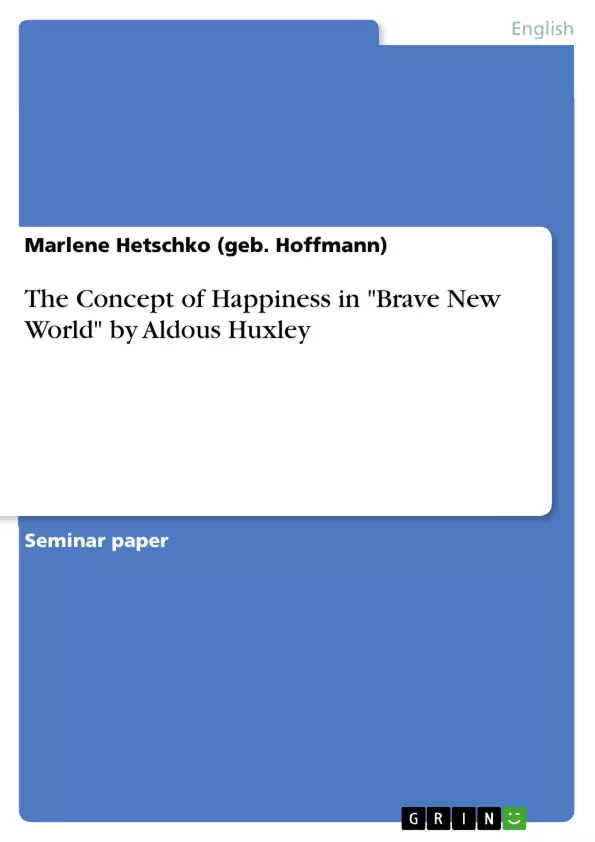In this paper, the happiness concept in Brave New World will first be described in some detail by defining different parameters. It will be argued that the happiness concept grounds on five different aspects of life: entertainment and leisure, conditioning and ignorance, productivity and stability, promiscuity, and consumption as well as the happiness drug soma. In chapter 3 problems with the concept and the underlying assumptions about happiness will then be examined.
The goal of this paper is to describe the underlying happiness concept based on the primary source. Moreover, doubts the novel casts on the concept will be described in conjunction with findings from the research on subjective well-being. The conclusion of the paper is thus that the measures undertaken in Brave New World are insufficient to attain happiness.
Table of Contents
- Introduction
- The Concept of Happiness in Brave New World
- Entertainment and Leisure
- Conditioning and Ignorance
- Productivity and Stability
- Promiscuity and Consumption
- SOMA - The Happiness Drug
- Problems within the Concept
- Two Happiness Concepts within the Novel
- Love and Mental Needs
- The Consequences of Soma
- Exile for Non-Conformists
- Conclusion
Objectives and Key Themes
This paper aims to analyze Aldous Huxley's concept of happiness as presented in Brave New World, comparing it with existing research on subjective well-being. It seeks to describe the parameters of happiness within the novel's dystopian society and to critique the underlying assumptions of this system.
- The definition of happiness in Brave New World
- The role of pleasure, entertainment, and sensory stimulation in achieving happiness
- The societal mechanisms employed to control and manipulate happiness (conditioning, ignorance, soma)
- The limitations and contradictions inherent in the novel's concept of happiness
- The comparison between the novel's approach to happiness and existing research on subjective well-being
Chapter Summaries
Introduction: This introductory chapter sets the stage by presenting a quote from Brave New World illustrating Mustafa Mond's defense of the totalitarian state's system through the lens of universal happiness. It then explores the historical and philosophical perspectives on happiness, ranging from ancient Greek philosophers like Aristotle to utilitarian thinkers like Bentham and Mill. The chapter establishes the paper's focus: analyzing the concept of happiness in Brave New World and comparing it to contemporary research on subjective well-being, ultimately arguing that the novel's methods are insufficient to achieve genuine happiness.
The Concept of Happiness in Brave New World: This chapter delves into the novel's portrayal of happiness, characterizing it as a "bottom-up" theory where pleasure accumulates to create overall happiness. The chapter highlights the emphasis on sensual pleasure and effortless ease in the lives of citizens, exemplified by the quote: "They always get what they want, and they never want what they can't get." It establishes five key aspects of this happiness concept: entertainment and leisure, conditioning and ignorance, productivity and stability, promiscuity and consumption, and the use of the happiness drug, soma. The chapter lays the groundwork for subsequent critiques of this model.
Keywords
Happiness, Brave New World, Aldous Huxley, subjective well-being, dystopia, pleasure, conditioning, ignorance, soma, consumerism, stability, totalitarianism, sensory stimulation, critique.
Brave New World: A Deep Dive into Happiness - FAQ
What is the purpose of this document?
This document provides a comprehensive preview of an academic paper analyzing the concept of happiness in Aldous Huxley's Brave New World. It includes the table of contents, objectives and key themes, chapter summaries, and keywords.
What topics are covered in the Table of Contents?
The table of contents outlines the paper's structure, covering an introduction, a detailed exploration of the concept of happiness within Brave New World (including sub-sections on entertainment, conditioning, productivity, promiscuity, and the drug Soma), an examination of problems within that concept (including discussions of differing happiness concepts, love, the consequences of Soma, and exile), and finally, a conclusion.
What are the main objectives and key themes of the paper?
The paper aims to analyze Huxley's portrayal of happiness in Brave New World, comparing it to existing research on subjective well-being. It explores the parameters of happiness within the novel's dystopian society and critically examines the underlying assumptions of that system. Key themes include the definition of happiness in the novel, the role of pleasure and sensory stimulation, societal mechanisms for controlling happiness (conditioning, ignorance, soma), the limitations and contradictions of the novel's concept of happiness, and a comparison with contemporary research on subjective well-being.
What is summarized in each chapter?
The Introduction sets the scene using a quote from the novel and explores historical and philosophical perspectives on happiness. The Concept of Happiness in Brave New World chapter delves into the novel's portrayal of happiness, highlighting its emphasis on sensual pleasure and ease, and identifies five key aspects of this happiness: entertainment, conditioning, productivity, promiscuity, and soma. The document only provides summaries for these two chapters.
What are the keywords associated with this paper?
The keywords are: Happiness, Brave New World, Aldous Huxley, subjective well-being, dystopia, pleasure, conditioning, ignorance, soma, consumerism, stability, totalitarianism, sensory stimulation, critique.
What type of academic work is this a preview of?
This is a preview of an academic paper intended for analysis of themes in a structured and professional manner.
What is the intended audience for this preview?
The intended audience is likely academics and students interested in Aldous Huxley, Brave New World, dystopian literature, and the philosophy of happiness.
- Citar trabajo
- M.Ed, B.A. Marlene Hetschko (geb. Hoffmann) (Autor), 2013, The Concept of Happiness in "Brave New World" by Aldous Huxley, Múnich, GRIN Verlag, https://www.grin.com/document/1132639



